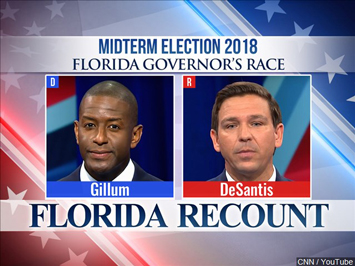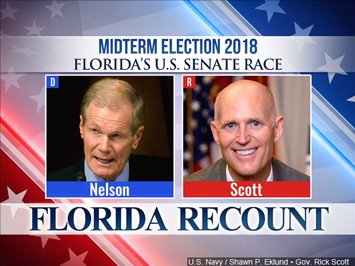More congressional clashes and D.C. gridlock on the horizon
By Askia Muhammad -Senior Editor- | Last updated: Nov 14, 2018 - 9:02:43 AMWhat's your opinion on this article?

A crowd protests outside the Broward County Supervisor of Elections office, Nov. 9, in Lauderhill, Fla. Florida is once again at the center of election controversy, but this year there are no hanging chads or butterfly ballots like in 2000. And no angry mobs in suits—at least not yet. Photo: AP Wide World Photo/Joe Skipper
Graphics: MGN Online
|
WASHINGTON—While the name Donald J. Trump did not appear on a single U.S. ballot Nov. 6, 2018, “Trump-ism” was clearly on voters’ minds when they went to the polls.
In the 435 Congressional seats at stake, Democrats retook the majority, defeating more than 30 Republicans, the most since the 1960s. This gives Democrats subpoena power for the first time since Mr. Trump was elected two years ago.

|
In Georgia and Florida, three statewide races are within the razor-thin margin. Georgia Secretary of State Brian Kemp holds a slim lead over Democratic challenger Stacey Abrams, who is vying to be the first Black woman governor in U.S. history. In Florida, Democrat Andrew Gillum first conceded to Republican Ron DeSantis then withdrew his concession. Gillum was attempting to become Florida’s first Black governor but faced a string of racist attacks from outside groups and DeSantis, who told Floridians not to “monkey this up.”

|
Election night saw a number of firsts for women, particularly non-White women. For the first time there will be more than 100 women in the House of Representatives, including: Deb Haaland in New Mexico and Sharice Davids in Kansas. They made history becoming the nation’s first Native American congresswomen. Rashida Tlaib in Michigan and Ilhan Omar in Minnesota became the first Muslim women elected to Congress.
And in New York City, 29-year-old Democratic Socialist Alexandria Ocasio-Cortez has become the youngest woman ever elected to Congress. “We were able to organize everyday people, knocking on our neighbors’ door. And despite being outspent $4 million, 18 or 13 to one; despite the fact that we were running against a 10-term incumbent; despite the fact that it was your first time running for office; despite the fact that we didn’t have the money; despite the fact that I’m working-class—despite all those things, we won,” she declared after her victory.
MIDTERM ELECTIONS GROUNDBREAKING FOR WOMEN
—AT LEAST 100 WOMEN WILL SERVE IN THE HOUSE

(l-r) Alexandria Ocasio-Cortez -New York, Ayanna Pressley -Massachusetts, Jahana Hayes -Connecticut, Veronica Escobar -Texas, Sylvia R. Garcia -Texas
|
In New England, two states elected their first Black congresswomen: Ayanna Pressley in Massachusetts and Jahana Hayes in Connecticut. And Veronica Escobar and Sylvia Garcia have become the first two Latina congresswomen in Texas. And a ballot measure with lasting effects was approved by voters in Florida who approved a historic ballot measure to re-enfranchise 1.4 million people with felony convictions.
And in Mississippi, former Agriculture Secretary and Congressional Black Caucus member Mike Espy is headed for a Nov. 27 run-off against state Sen. Cindy Hyde-Smith, who recently said, “if (a White cattle rancher who praised her) invited me to a public hanging, I’d be on the front row.”
Meanwhile, President Trump made several post-election headlines for himself. He asked for and received the resignation of Attorney General Jeff Sessions, replacing him with Mr. Sessions’ former chief of staff, Matthew Whitaker, an “acting” appointee, who is limited to no more seven months before requiring Senate confirmation. The move is widely seen as a step toward limiting the investigation by Special Counsel Robert Mueller into possible wrongdoing by Mr. Trump during the 2016 presidential campaign.
And the president unleashed a series of offensive comments to three Black female White House correspondents—April Ryan of American Urban Radio Network (AURN); Yamiche Alcindor, PBS; and Abby Phillip of CNN—calling Ms. Ryan “a loser” after telling her to “sit down” during a press conference; he lambasted Ms. Phillip declaring, “What a stupid question that is,” in response to a query about the Whitaker appointment; and he told Ms. Alcindor, “That’s such a racist question,” when she asked if his harsh, racially-coded rhetoric might be “emboldening White nationalists” on the campaign trail.
The president’s remarks were widely condemned. The rhetorical breakdowns represent a “failure in leadership,” retiring Republican Rep. Ryan Costello (R-Pa.) said repeatedly after Mr. Trump blamed losing Republican candidates for not sufficiently embracing his policies. “It’s like, to your point, dancing on somebody’s grave,” Mr. Costello told CNN. “It’s highly inappropriate, and it’s deeply offensive, and every single one of those members took tough votes in order to advance a center-right agenda because they believed in it.”
It is that contradiction, that even White, “anti-Trump” politicians are still opposed to policies that would benefit Black people. “The issue is whether or not this country can deal with a White supremacist in the White House,” Dr. Ray Winbush, director of the Institute for Urban Research at Morgan State University said in an interview. “Trump does have an ideology, and his ideology is White supremacy, which is at the basis of how this country runs.
“The question is, can this country deal with a White supremacist, and how do you do that in a political framework? That’s the question I think this country has to ask itself.” Howard University scholar Dr. Greg Carr agrees. “Once again, enough Whites voted ‘race first’ to re-install hate-spewers in many elected offices,” the chair of the university’s African American Studies Department said. “That includes open racists running hyper-racist campaigns. Whiteness was conceived as a global criminal enterprise. It won’t go away by appealing to it. You have to break its back,” Dr. Carr said.
“America faces an internal rot with her huge fiscal deficits, her fractured political system, her ugly political and public discourse, her frayed social networks, her rejection of spiritual values and a penchant for violence and mass shootings,” the Honorable Minister Louis Farrakhan said recently in a statement regarding his trip to Iran and message to Iran and America.
INSIDE STORIES AND REVIEWS
-
-
About Harriett ... and the Negro Hollywood Road Show
By Rabiah Muhammad, Guest Columnist » Full Story -
Skepticism greets Jay-Z, NFL talk of inspiring change
By Bryan 18X Crawford and Richard B. Muhammad The Final Call Newspaper @TheFinalCall » Full Story -
The painful problem of Black girls and suicide
By Charlene Muhammad -National Correspondent- » Full Story -
Exploitation of Innocence - Report: Perceptions, policies hurting Black girls
By Charlene Muhammad -National Correspondent- » Full Story -
Big Ballin: Big ideas fuel a father’s Big Baller Brand and brash business sense
By Bryan Crawford -Contributing Writer- » Full Story






 Click Here Stay Connected!
Click Here Stay Connected!








